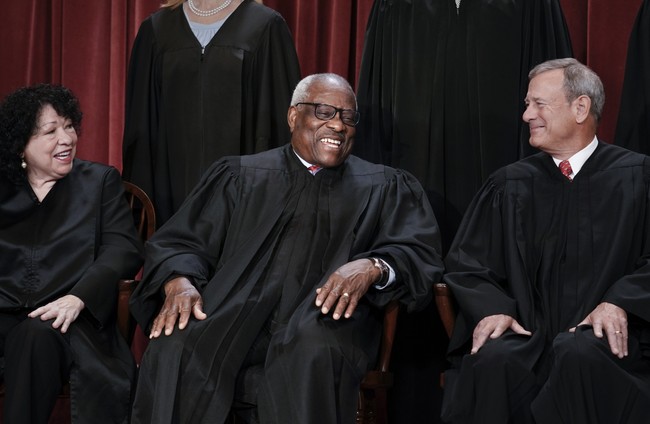
The Supreme Court suggested that they had a real desire to address the issues of jurisdiction and national injunctions imposed at the district-court level. The court scheduled what was essentially a snap hearing on the matter, which arose out of challenges to Donald Trump’s executive order redefining and narrowing “birthright citizenship.” Today is the last day of the term for oral argument, implying even further their desire to address the proliferation of orders at the district level that apply far outside their own jurisdictions.
After listening to over two hours of oral argument this morning (and counting!), it seems unclear why the court rushed to address it. It’s always a bit of a fool’s errand to guess the outcome based on the Socratic questioning used in oral arguments, but none of the justices — with the possible exception of Clarence Thomas — seemed enthusiastic about the arguments to curtail the practice. If that bears out, it makes one wonder which four justices granted cert, and why.
At first, observers seemed unclear what the scope of the argument would be. Politico wondered how much of this would be on the merits of the EO, and how much would be on process issue:
Will the justices wade into the constitutionality of Trump’s effort to deny citizenship to children born in the U.S. whose parents are undocumented immigrants or here on temporary visas? Or will the justices sidestep that legal lightning rod for now and focus solely on a more procedural, yet still momentous, issue: whether lower-court judges will retain the authority to block federal policies nationwide.
“It’s the question that’s on everyone’s minds,” said Columbia Law professor Elora Mukherjee, an expert on immigration law. “I anticipate we’ll see some discussion of the underlying merits, but I am not clear on how much.”
Most cases that come to the court have a precise “question presented” that tees up the legal issue to be resolved. But the birthright citizenship cases arrived as a trio of expedited appeals on the court’s emergency docket, not through the customary briefing process. And when the court took the rare step of ordering special oral arguments on those appeals, it was silent on what question or questions should be addressed.
In the end, most of the discussion centered on the jurisdictional issue. Two of the justices tried digging into the merits by asking pointed questions about the history of the 14th Amendment. Justice Sonia Sotomayor pursued it the hardest, insisting that the Trump policy “violates four Supreme Court precedents.” Sotomayor got so contentious that she kept cutting off answers from Solicitor General D. John Sauer, prompting an intervention by Chief Justice John Roberts at one point, scolding Sotomayor by saying, “I’d really like to hear his full answer.”
Listening to the birthright citizenship oral argument at the US Supreme Court. Justice Sotomayor continues to be argumentative, ask questions without allowing a response and monopolizes the Court’s time. Chief Justice Roberts had had enough and cut her off. Later, he directly…
— Martin Harry (@MartinHarryFL) May 15, 2025
Both sides engaged on the merits to some extent, but in the end, even those discussions ended up in the context of process, mainly in how to address an executive policy that applies nationally but may violate the law or the Constitution. The plaintiff attorney, New Jersey Solicitor General Jeremy Feigenbaum, posited that the issue of jurisdiction is too much of an obstacle when it comes to the ability of states to comply individually when a patchwork of conflicting decisions begin emerging. And frankly, there didn’t seem to be much pushback on that point from any of the justices to Feigenbaum’s point.
NYT legal reporter Adam Liptak sums this up with fair accuracy:
The justices have been struggling with two contrary impulses. Many are troubled by injunctions issued by individual federal judges that block executive branch initiatives nationwide. But many of them are also troubled by the executive order seeking to ban birthright citizenship and frustrated by the difficulty of reaching the merits, as the Trump administration has only appealed on the first point.
New Jersey’s lawyer may have offered a middle ground, arguing that this is the rare case in which nationwide relief is needed because it is the only way to grant complete relief to the more than 20 plaintiff states.
There may be good test cases to limit district court jurisdiction, but the birthright citizenship issue may not be the best basis for it. It implicates state interests too heavily — which Feigenbaum argued very effectively — and they can’t form a class-action for litigation that some justices suggested would be the way to deal with jurisdiction. Justice Elena Kagan actually spoke to that point near the end, castigating “forum shopping” and considerable frustration at the court. Kagan actually sounded the most hostile to jurisdiction hopping and forum shopping. Kagan does seem interested in curtailing these impulses — but that this case wouldn’t be the proper one to use, largely because the rulings in every jurisdiction have all gone in one direction.
The hearing is still continuing as this goes live on the site. Sauer still has a rebuttal period left, which means this will likely extend this one-hour argument to somewhere near triple its scheduled length. I’ll update this post with reactions from other analysts, but my impression is that the court may do something about universal injunctions … but not this time.
Update: Hugh Hewitt sounds a bit more optimistic:
General Sauer had a concise and compelling rebuttal slamming nationwide injunctions allowing district courts to think of themselves as holding roving commissions and issuing snap judgments. I hope SCOTUS brings down the curtain on this surge in such blanket orders. If urgent, a…
— Hugh Hewitt (@hughhewitt) May 15, 2025
If urgent, a case can get to SCOTUS quickly without the grandstanding of trial judges no matter how great they assess their own constitutional chops.
I certainly agree that Sauer’s rebuttal was perhaps his strongest moment. If the court truly wants to end forum-shopping, this case and today’s arguments offer them an opportunity. However, they seem very concerned about the government’s argument for continuing to enforce its interpretation of birthright citizenship, which suggests that the White House will lose big-league when this gets considered on the merits, likely in the next term.
Update: Changed the headline for more clarity on “jurisdiction.”












